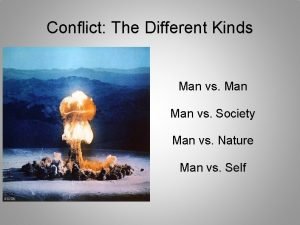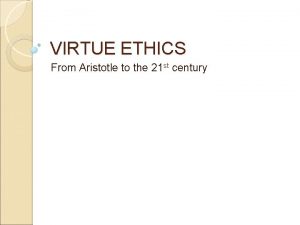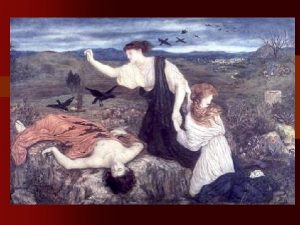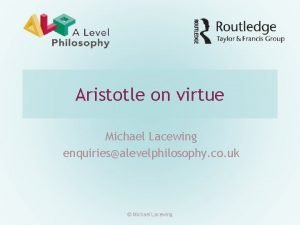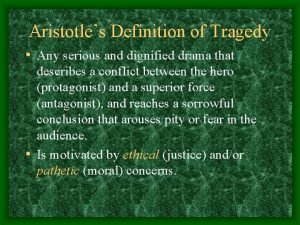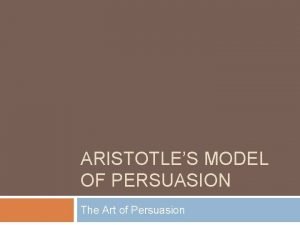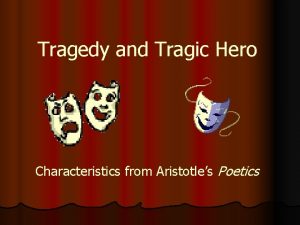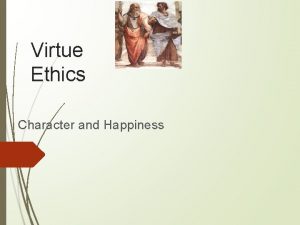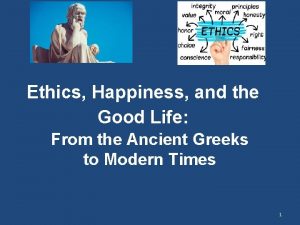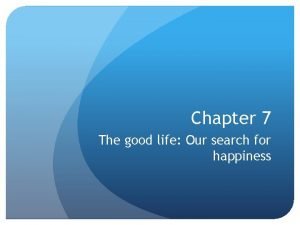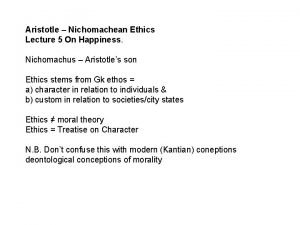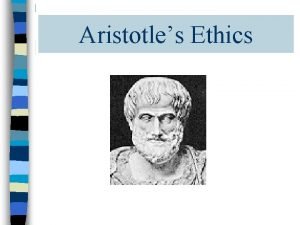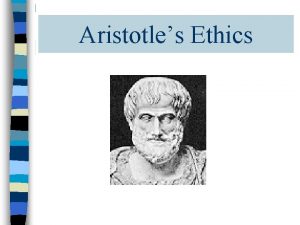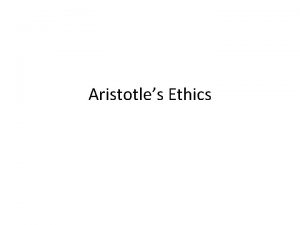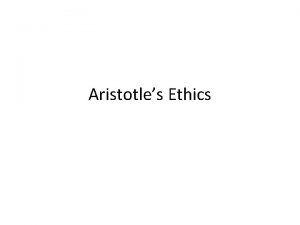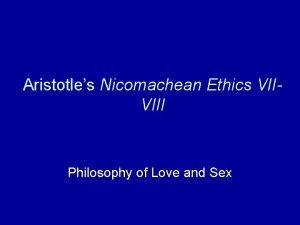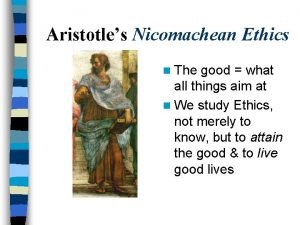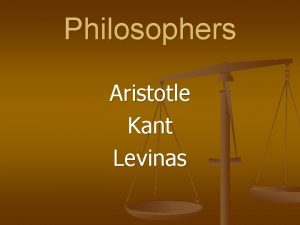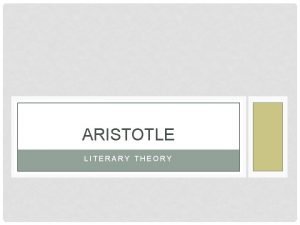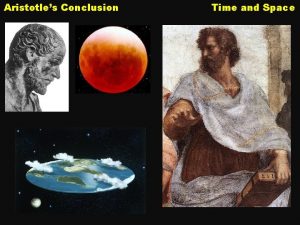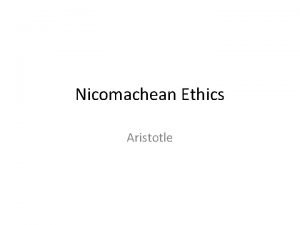Aristotle Nichomachean Ethics Aristotles Nicomachean Ethics Man can


![Nichomachean Ethics • Pleasure and Happiness – Reaction to Eudoxus • “the [highest] good Nichomachean Ethics • Pleasure and Happiness – Reaction to Eudoxus • “the [highest] good](https://slidetodoc.com/presentation_image_h/b510901e79d9e5637eb6b61d89452700/image-3.jpg)










- Slides: 13

Aristotle Nichomachean Ethics

Aristotle’s Nicomachean Ethics • Man can only achieve happiness by using • all his abilities and capabilities 3 forms of happiness – – – Life of pleasure and enjoyment Life as a free and responsible citizen Life as a thinker and philosopher • All 3 must be present and balanced • The “Golden Mean” – Be neither cowardly or rash, but courageous – Be neither miserly nor extravagant, but liberal – Eat not too little or too much, just enough
![Nichomachean Ethics Pleasure and Happiness Reaction to Eudoxus the highest good Nichomachean Ethics • Pleasure and Happiness – Reaction to Eudoxus • “the [highest] good](https://slidetodoc.com/presentation_image_h/b510901e79d9e5637eb6b61d89452700/image-3.jpg)
Nichomachean Ethics • Pleasure and Happiness – Reaction to Eudoxus • “the [highest] good is pleasure” line 1 – And to Speusippus • “that pleasure is something utterly bad” line 1 -2

The Means to an End • An attempt to find our chief end or highest good • Many “ends” in life are only means to further ends (see “school”) – Our aspirations and desires must have some final object or pursuit • This is universally called “happiness”

Happiness • Means different things to different people • Need to define – Must be based on human nature – Must begin from the facts of personal experience • Happiness cannot be found in abstract or ideal notion – ie. Plato’s concept of self-existing “good” – Nothing innate • Must be practical and human

Analysis of the Soul Calculative -- Intellectual Virtue Rational Appetitive -- Moral Virtue Irrational Vegetative -- Nutritional Virtue

The Activity of Reason • Disagrees that pleasure is the highest good (Eudoxus) • Disagrees that pleasure is something bad (Speusippus) • Pleasure is a means to an end – Human happiness • Happiness is NOT the pursuit of pleasure, not amusement or • repression Happiness is virtuous activity – The activity of reason

Moral Virtues • The ability to regulate desires is not instinctive – A learned behavior • Outcome of teaching and practice • Too much or too little = problem! – “excessive or deficient exercise is fatal to strength” • Desire regulating virtues are character traits – Not to be understood as emotions or mental faculties

The Doctrine of the Mean • Moral virtues are desire-regulating character traits which are a mean (medium between two extremes) between more extreme character traits (vices).

The Golden Mean • Natural emotion of fear Vice of Deficiency Virtuous Mean Cowardice Courage Vice of Excess Rashness

Vice of Deficiency Virtuous Mean Vice of Excess Cowardice Courage Rashness Insensibility Temperance Intemperance Illiberality Liberality Prodigality Pettiness Munificence Vulgarity Humble-mindedness High-mindedness Vaingloriness Want of Ambition Right Ambition Over-ambition Spiritlessness Good Temper Irascibility Surliness Friendly Civility Obsequiousness Ironical Depreciation Sincerity Boastfulness Boorishness Wittiness Buffoonery Shamelessness Modesty Bashfulness Callousness Just Resentment Spitefulness

Pleasure • Rejects pleasure that originates in immoral acts such as greed or • • • treachery (the ends do not justify the means) Object as well as the origin must be virtuous Because certain pleasures are immoral in origin or object, pleasure cannot be the greatest good, the goal, the end result Not every pleasure can be desireable

Happiness • Pleasure perfects all activities • Pleasure affects the whole quality of man’s life • Life, in this most perfect state is called Happiness • Happiness is the state of virtuous action, the action of reason.
 What type of conflict is man vs. society?
What type of conflict is man vs. society? Aristotle virtues
Aristotle virtues Noble stature definition
Noble stature definition Aristotle virtues
Aristotle virtues Aristotles unities
Aristotles unities Serious and dignified
Serious and dignified Aristotle’s definition of tragedy
Aristotle’s definition of tragedy Aristotles model
Aristotles model Aristotle poetics tragic hero
Aristotle poetics tragic hero What were aristotle's virtues
What were aristotle's virtues Virtue ethics
Virtue ethics Aristotle ethics happiness
Aristotle ethics happiness Virtue ethics objections
Virtue ethics objections Natural law and morality
Natural law and morality
